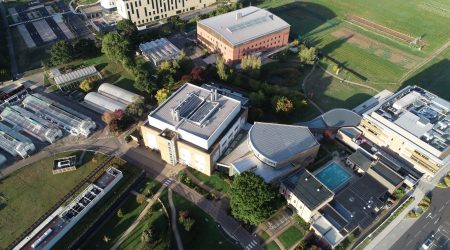We caught up with Dr Rachel Prior who recently completed her PhD at the John Innes Centre
Having been introduced to the unfamiliar world of science policy on a Professional Internship for PhD Students (PIPS) during her studies, Rachel is now preparing to join the Civil Service Fast Stream.
What were you researching at the John Innes Centre?
I worked with Professor Mike Bevan on understanding how one particular gene, called DA1, controls organ size in Arabidopsis (thale cress).
DA1 controls the timing of the arrest of cell proliferation, at least that was what was previously thought. My research showed that, as with everything, it isn’t quite that simple.
What was your experience on the PIPS placement?
I joined the Research Service, in the Environment and Transport team at the National Assembly of Wales.
They take you on as a member of the team and you do what they do which is writing blog posts, guides and briefing documents and dealing with enquiries. You’d get a call or email from an Assembly Member who’d say, ‘I’m giving a speech next week, I need this information’ and you’d just have to produce it.
It was fast-paced and unpredictable; exciting compared to the more long-range view of a PhD.
Did the experience contribute to your decision to apply for the Civil Service Fast Stream after your PhD was finished?
Definitely. I applied for policy officer roles at several charities, and learned societies and that kind of thing. But I concluded that these organisations were often just lobbying not contributing to actual decision-making.
With government policy, your work hopefully contributes to ministers making policy decisions.
During my internship, the office building was attached to the Assembly building and you could go and sit in the gallery to see the person who you’d written a briefing for stand up and talk. So that’s why I decided on government: because it was exciting being close to the action.
Why is it important to have academia involved in government policy?
We need people who decide where the funding goes to understand that we’re doing useful work.
Often if I talk about my PhD, people say, ‘why should we care what Arabidopsis does, we only care about wheat’, because wheat is what we eat. And that could easily be a commonly held opinion among people who choose where the money goes. So it’s important for us so that we can continue doing the work that we need to do.
If you don’t have somebody advocating for science and ensuring that what we’re coming up with is getting used, then what’s the point?
Fundamental research is important but it’s all to support the improvement of society and unless it can get through to decision makers like ministers, then it’s getting lost in translation.
What’s the Civil Service Fast Stream about?
The government call it their flagship leadership programme.
Essentially you go in at a level that would be slightly up from an undergraduate position. Then you’re given training and opportunities to accelerate your development over three or four years.
It’s a rotation programme, so you get to try out a range of departments. And at the end of the three years you’re guaranteed a job in the Civil Service.
Do you feel like doing a PhD has prepared you for a career in the Civil Service?
I can definitely say that I would not have got onto the Fast Stream without a PhD – people do the Fast Stream without a PhD all the time, but for me I think doing one made me much more self-aware.
Experience of having to make decisions and self-motivate really helped me during the application process. Having to write a PhD thesis also means writing documents doesn’t seem overwhelming.
The independence that you develop during a PhD is useful in any work place not just a policy-related one. You have to make a lot of decisions during your PhD about the direction of your project, which gives confidence in your ability to make decisions.
I really recommend that PhD students apply for PIPS.
A few people that I persuaded to do it thought differently about their career path subsequently. Just applying for the Civil Service was a valuable experience. If you get to the assessment centre they give you the most amazing feedback.
Basically, I can’t recommend either of them highly enough.





